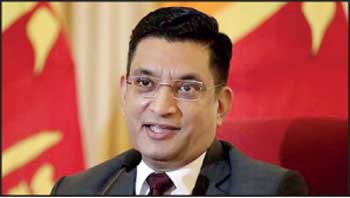Sunday Feb 22, 2026
Sunday Feb 22, 2026
Saturday, 31 August 2024 00:19 - - {{hitsCtrl.values.hits}}
 |
| Foreign Affairs Minister Ali Sabry |
Foreign Affairs Minister Ali Sabry this week expressed concern over calls for renegotiating agreements with the International Monetary Fund (IMF), labelling them as politically motivated.
He warned that such renegotiations could delay economic progress and result in significant financial losses.
“For those considering pursuing this challenging and often unsuccessful process of renegotiation, I wish them good luck,” Sabry stated, explaining that renegotiating the Debt Sustainability Analysis (DSA) could take at least another one to two years.
Addressing the media, held at the Presidential Media Centre on Wednesday, he also warned that such delays could result in the withholding of $ 1.2 to 1.3 billion in funds from the IMF, World Bank and Asian Development Bank, leading to economic instability, potential rupee devaluation and increased inflation.
The Foreign Affairs Minister also highlighted the Ministry’s role in supporting Sri Lanka’s economic recovery and promoting the interests of the Global South in multilateral forums.
Sabry also outlined Sri Lanka’s diplomatic strides and economic recovery efforts since the country faced severe financial instability in 2022.
“In 2022, the Foreign Affairs Ministry was assigned a crucial role amid the country’s challenging circumstances. We faced the task of rebuilding strained foreign relations, regaining the trust of the international community and leveraging international relations to boost the country’s economy. After two and a half years of dedicated effort, we have successfully stabilised the country. Our international reputation now reflects the positive results achieved domestically,” he explained.
The Minister credited the leadership of President Ranil Wickremesinghe for these accomplishments, noting that it was instrumental in Sri Lanka’s rapid recovery.
“Securing agreements with 17 countries for debt restructuring is a significant achievement for us,” he said, emphasising that these efforts have upheld Sri Lanka’s foreign policy, sovereignty and local identity.
According to Sabry, the swift stabilisation of the economy has set a global example, with countries such as Pakistan, the Maldives and Bangladesh now seeking Sri Lanka’s advice on economic revitalisation.
Comparing Sri Lanka’s recovery with other nations that have faced similar economic crises, Sabry pointed out that while Greece took 12 years to recover, Sri Lanka has managed to stabilise its economy in just a few years.
He highlighted that Sri Lanka stands out among countries like Lebanon, Venezuela, Argentina and Zimbabwe, which have not yet achieved similar recovery milestones.
He noted Sri Lanka’s recent election to four United Nations mechanisms, including the Committee on the Elimination of Discrimination against Women and the UNESCO Executive Board, as evidence of the country’s growing influence on the global stage.
In a recent ForeignPolicy.com article, Sri Lanka’s foreign policy was praised for its adept navigation of global power dynamics, maintaining strong relations with major international powers despite the geopolitical challenges faced by smaller sovereign States.
Sabry attributed this success to the experience, knowledge, and diplomatic skills of President Wickremesinghe, who he described as the only Sri Lankan leader capable of direct engagement with heads of state worldwide.
Sabry also commended the President for preserving the independence of the Sri Lankan Foreign Service, ensuring it operates without political influence. He highlighted that under Wickremesinghe’s directive, the Foreign Service enjoys a level of autonomy surpassing even that achieved during the tenure of former Foreign Minister Lakshman Kadirgamar.
These diplomatic and economic efforts, Sabry emphasised, reflect the concerted effort by the Sri Lankan government to stabilise and strengthen the nation amidst challenging circumstances, reinforcing its commitment to a sustainable and prosperous future.